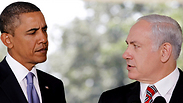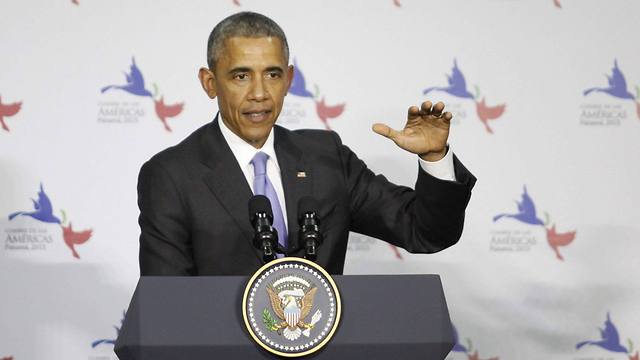
Obama: Netanyahu has not offered alternative to Iran deal
US president criticizes prime minister for opposing deal without providing an alternative that 'makes it less likely for Iran to get a nuclear weapon'.
"The Prime Minister of Israel is deeply opposed to it," Obama said about the deal. "I think he’s made that very clear. I have repeatedly asked - what is the alternative that you present that you think makes it less likely for Iran to get a nuclear weapon? And I have yet to obtain a good answer on that that."
Obama made it clear that he would not allow an immediate and complete removal of sanctions. "We are not done yet," he declared.
"What we were able to obtain was a political framework between the P5+1 nations and Iran that provided unprecedented verification of what is taking place in Iran over the next two decades that significantly cuts back on its centrifuges, that cuts off pathways for it to obtain a nuclear weapon, and that calls for, in return, the rolling back of sanctions in a phased way that allows us to snap back if Iran violates the agreement," the president said.
Sharply differing interpretations have emerged on what was covered by last week's framework agreement.
Iranian Supreme Leader Ayatollah Ali Khamenei, who has the final say for Iran on the deal, on Thursday ruled out any "extraordinary supervision measures" over nuclear activities and said military sites could not be inspected.
US defense chief Carter, meanwhile, told CNN the nuclear deal must include ways to verify Tehran's compliance. "It can't be based on trust. It has to have adequate provisions for inspections," he said, adding inspections "absolutely" would have to include military sites.
In his remarks on Saturday, Obama said the contrasting statements were a result of internal politics in Iran.
"Iran has its own politics around this issue," he said. "They have their own hardliners. They have their own countervailing impulses in terms of whether or not to go forward with something, just as we have in our country. And so it’s not surprising to me that the Supreme Leader or a whole bunch of other people are going to try to characterize the deal in a way that protects their political position. But I know what was discussed at - in arriving at the political agreement."
President Obama acknowledged the risk posed by signing an agreement, but said Western powers are prepared for a scenario in which Iran violates the agreement.
"What I’ve always said, though, is that there’s the possibility of backsliding. There’s the possibility that it doesn’t get memorialized in a way that satisfies us that we’re able to verify that, in fact, Iran is not getting a nuclear weapon, and that we are preserving the capacity to snap back sanctions in the event that they are breaking any deal," he said.
Obama bemoaned the fact opponents had argued against the deal without even seeing it, and that there was no reason to speculate about the meaning of a deal. "Either there’s going to be a document that Iran agrees with the world community about and a series of actions that have to be taken, or there’s not," he said.
The previous public scuffle between the two leaders occurred on Tuesday, when Obama said he opposed Netanyahu's demand that any deal with Iran must include its recognition of Israel's right to exist.
"The notion that we would condition Iran not getting nuclear weapons in a verifiable deal on Iran recognizing Israel is really akin to saying that we won't sign a deal unless the nature of the Iranian regime completely transforms," Obama said in an interview with National Public Radio (NPR).












